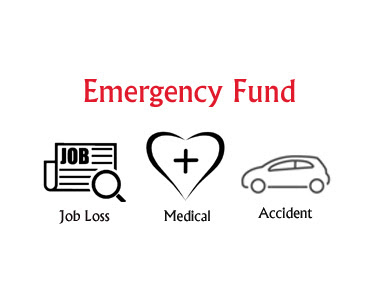Having an emergency fund can ease financial, emotional pressure.....by FinVise India
**Source: MINT
Vidya, an old client, called me at 9 pm once. I found it a bit strange because I do not receive calls from clients so late, but I took the call. She told me her husband, Venkat, who is a heart patient, had to undergo bypass surgery immediately. He was denied health insurance by many companies because of his ailment. In the couple's last review two weeks before, they were asked to keep six to eight months' expenses in a Flexi bank fixed deposit (FD) for any emergency. Unfortunately, that didn't happen. Vidya had stopped working, and to meet daily expenses, they had to stop their systematic investment plans (SIPs) too. Their next option was to redeem the investments they had accumulated to fund their son's higher education. However, the money would take five working days to reach her bank account and the payment to the hospital had to be made immediately. So, she had to borrow money from her brother for five days.
Vidya, an old client, called me at 9 pm once. I found it a bit strange because I do not receive calls from clients so late, but I took the call. She told me her husband, Venkat, who is a heart patient, had to undergo bypass surgery immediately. He was denied health insurance by many companies because of his ailment. In the couple's last review two weeks before, they were asked to keep six to eight months' expenses in a Flexi bank fixed deposit (FD) for any emergency. Unfortunately, that didn't happen. Vidya had stopped working, and to meet daily expenses, they had to stop their systematic investment plans (SIPs) too. Their next option was to redeem the investments they had accumulated to fund their son's higher education. However, the money would take five working days to reach her bank account and the payment to the hospital had to be made immediately. So, she had to borrow money from her brother for five days.
In another case, Bharati, a single mother, who has worked with us for eight years, came weeping one day that her father had been hospitalized and she was falling short of ? 1 lakh. He was in ICU and the daily bill was ? 1 lakh. Though her brother had arranged some funds, the hospital was not sending him home because of the shortage. I helped her out immediately.
In both cases, the families didn't have health insurance or an emergency fund, and the events were unforeseen, yet, needed immediate financial resolution. Moreover, the medical emergencies created a dent in the family's cash flow needs and goals.
Mahendra was working in a successful e-commerce company. But the company got merged with another and his team was no longer required. He was laid off with compensation of two months' salary. There were many issues to deal with at that juncture: the family's expenses and loans, and the fact that loss of income would severely affect his financial goals in the future, with increasing inflation. With a break in income, he would need to invest one-and-a-half times more to meet the same goal that is three years away.
If there is a medical emergency, and a family member or relative needs immediate medical attention or hospitalization, there may also be emergency travel expenses to provision for. In case the need to stay is longer, one would also need to be able to pay for the family's fixed expenses and loans during the period.
Many such situations warrant the need to have an emergency fund. But apart from unplanned emergencies, there could be other situations to deal with.
For instance, when a couple is planning for a child, it is imperative for them to set aside 15-18 months of expenses as reserves in an emergency fund, especially if the woman plans to take a sabbatical from work. While her contribution to family expenses would stop, with the addition of a new family member, the household budget would go up.
When a bread earner of a family is bitten by the startup bug, there are innumerable discussions around the topic with the financial planner. There is anxiety about the fact that the startup may not work, and also about the family's expenses, such as children's education and vacation, given that a startup needs undivided time and attention. It's important to analyze the household budget for the gestation period of the startup becoming profitable and create an emergency fund to meet it.
Creating an emergency fund
So what should you consider while creating an emergency fund? Emergency fund requirements differ for different people, depending on whether they are married, unmarried, have a single income but no children, have double income and children or have double income but no children.
However, the thumb rule is to set aside 6 to 12 months of one's expenses, committed savings and liabilities to provide for a safe emergency fund. If it is not possible for you to set aside a large chunk as an emergency fund all at once, it's best to set aside a certain amount every month for 12 -24 months until the targeted emergency fund amount is reached.
Here are some of the instruments that can help you create an emergency fund.
Bank Flexi FD: The best way to access the money immediately is through a Flexi FD option. This instrument gives better returns than what a savings bank account offers. It also and allows immediate access to funds at the click of a button or at the swipe of a card at an ATM.
Liquid fund: A liquid fund is a good option if there is a need for a large emergency fund since the absolute gains one makes in a liquid fund score over those in a Flexi FD.
Once the emergency fund is used, ensure that it is replenished by monitoring your budget for a few months, or cutting back on certain discretionary expenses. Saying no to family night outs for some time can pay off when a family member needs your support, both financially and emotionally.
For more details on Mutual Funds, Financial Planning & Personal Finance contact us at :
Phone No. 9582250638
Email id: contact@finviseindia.com
Visit our website: www.finviseindia.com




Comments
Post a Comment